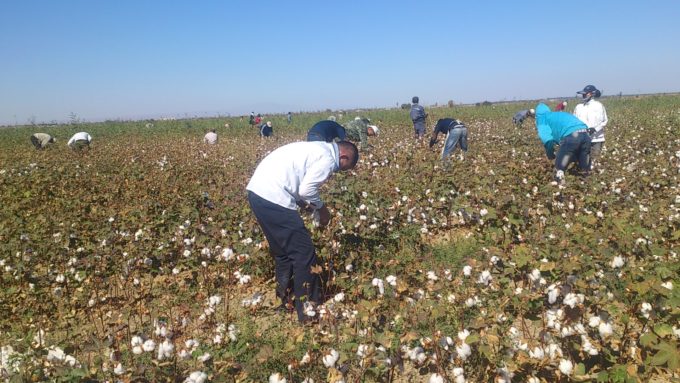Countries
Solidarity campaigns
A Peek Behind the World Bank’s Mask

On June 27 we released a joint report documenting forced and child labor linked to the World Bank’s agriculture projects in Uzbekistan. We hoped it would cause bank officials to rethink their approach. But then the bank’s country team inadvertently left an internal conversation on our voicemail. Oops! It revealed their ultimate goal: to protect the bank from external pressure and get new agriculture projects through their executive board “unscathed,” as one of the voices on the phone said. He went on: “We want to avoid any more stuff that goes out that says ‘oh and look [a board member is] really taking this seriously, now they’re going to call for a full board hearing.”
The country team’s strategy seems to have paid off. On June 30 the bank’s executive board approved yet another loan benefiting Uzbekistan’s cotton sector, which is at the center of the government’s forced labor system. The Australian constituency opposed the US$145 million irrigation project, and the United States, United Kingdom, and Nordic/Baltic constituency abstained. But the remainder of the board, including self-styled labor rights champions Canada, France, Germany, and the Netherlands, supported it.
The “strategic story line” to which the country team agreed on the call was to highlight to the board the bank’s role in reducing child labor in cotton, which according to them wouldn’t have happened “without the World Bank being involved,” and dismiss our research as “old news.”
But our research found that the Uzbek government is still forcing kids as young as 10 to work in 4 regions, including in a World Bank project area and one of the regions of the new project. And the bank can hardly take credit for the reduction in child labor since the greatest progress was made in the fall of 2012 and 2013, when the bank was still ignoring the problem.
In addition to cynically plotting to dismiss our research rather than respond to it, staff planned to point the board to “a lot of progress” since we undertook the research in 2015 and 2016. But the report, which we wrote with our partner organization the Uzbek-German Forum for Human Rights, details abuses until the close of last year’s harvest season. The Forum has continued to document forced and child labor this spring, and the next harvest does not begin until September. Any progress that the bank can point to since the end of last harvest can only be rhetorical in nature, when the real measure should be what is happening on the ground.
The bank’s new irrigation project is akin to an ongoing project in the west of the country, where we found that the government forced adults and children to harvest cotton in 2015 and 2016, as well as to weed the fields and plant cotton in the spring of 2016. These abuses took place on the bank’s project area, contrary to the government’s loan agreement with the bank. The country team noted on the call that this existing irrigation project hasn’t even gotten off the ground due to “very serious procurement issues.” But even the combination of human rights abuses and operational failures were not enough to convince the bank to hold off on a new, similar project.
Just prior to the message ending, I hear a voice I recognized say, “Why does this keep ringing, or trying to dial? Oh Jessica Evans on speed dial, that’s a frightening prospect.” I hate to be the staff’s nightmare, and I suppose one can understand the project staff feeling an urge to downplay rights abuses when the institution’s incentives reward getting money out the door above all else. But the World Bank president, Jim Kim, should turn this around. Instead of sending good money after bad, the bank should immediately suspend its agriculture investments in Uzbekistan, while supporting reforms to halt the Uzbek government’s use of forced labor to harvest its cotton.
by Jessica Evans, Senior Researcher/Advocate at Human Rights Watch for International Financial Institutions
Originally published at Huffington Post and Human Rights Watch
Source: UGF
